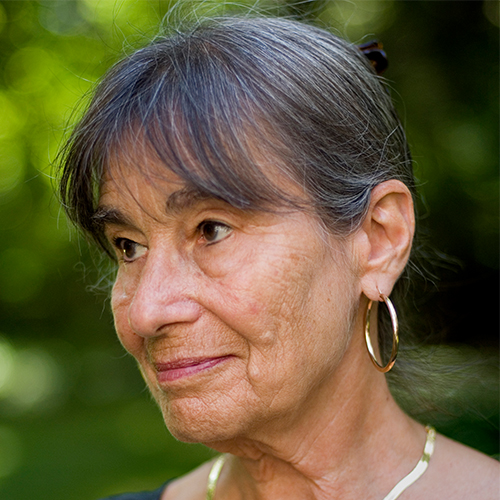Visiting Poets
Alicia Ostriker
A self-confessed “unashamed woman poet,” Alicia Ostriker writes about sex, war, pregnancy, mastectomy, rape, and religion, expertly intertwining the personal with the political, leading readers to ask whether these divisions ever existed at all. Poetry magazine proclaimed that she “leaps into her subjects with bristling intelligence, fierce humanity and wit,” and Maxine Kumin has said of her work, “Nowhere in late twentieth-century belles-lettres has the personal inserted itself so meaningfully into the political.” Wildly alive in body and mind, Ostriker is as deeply human as she is humorous. Both her poetry and her scholarly work are concerned with challenging received concepts of identity, speaking for women as diverse as Hagar, Miriam, Sheba, the “crazy” woman on the subway, and herself.
Twice nominated for the National Book Award, Ostriker is the author of 15 books of poems, including The Imaginary Lover, winner of the William Carlos Williams Award, The Crack in Everything and The Little Space, both finalists for the National Book Award, The Book of Seventy, winner of the Jewish National Book Award, and, most recently, the sage and delightful collection The Old Woman, The Tulip, and the Dog. Her poems have appeared in The New Yorker, American Poetry Review, The Atlantic, and Paris Review, among many others.
She has also published 8 works of critical prose. The ground-breaking Writing Like A Woman—in Ostriker’s words, meant both for “those readers who still have no idea why anyone would want to write like a woman, as well as those who know very well”—celebrates this crucial literary shift, which she appraises more comprehensively in Stealing the Language: The Emergence of Women’s Poetry in America.
The Nakedness of the Fathers: Biblical Visions and Revisions approaches the Torah with a midrashic sensibility. The Book of Life: Selected Jewish Poems 1979-2011 and prose works such as Feminist Revision and the Bible and For the Love of God: The Bible as an Open Book, examine Judiasm from a feminist perspective, laying bare the Bible’s historic marginalization of women and transforming it into something fresh and personal.
Born in New York City in the 1930s, Alicia Ostriker earned degrees from the University of Wisconsin-Madison and Brandeis University. She is professor emerita of English at Rutgers University, core faculty at the Low-Residency MFA Program at Drew University, and lives in Princeton, NJ. Named one of “10 Great Jewish Poets” by Moment magazine, she has received dozens of awards and prizes, including fellowships from the NEA, the Guggenheim the Rockefeller foundations. Joyce Carol Oates noted that “Alicia Ostriker has become one of those brilliantly provocative and imaginatively gifted contemporaries whose iconoclastic expression, whether in prose or poetry, is essential to our understanding of our American selves.”
Select Poems
To be blessed
said the old woman
is to live and work
so hard
God’s love
washes right through you
like milk through a cow
To be blessed
said the dark red tulip
is to knock their eyes out
with the slug of lust
implied by
your up-ended
skirt
To be blessed
said the dog
is to have a pinch
of God
inside you
and all the other dogs
can smell it
From THE TULIP, THE OLD WOMAN, AND THE DOG (University of Pittsburgh Press, 2014)
When they see me said the old woman
they stop where they are
and gaze into my eyes for as long
as I am willing to stand there
in the wind
at the edge of the forest
You are speaking of my mortal enemy
said the dark red tulip
they have eaten many of my family
they do not spare children
they are pests
beauty excuses nothing
Oh cried the dog
the very thought of them
thrills me to the bone
the chase as much as the capture
the scent weaving ahead of me like a flag
saliva spinning from my teeth
From THE TULIP, THE OLD WOMAN, AND THE DOG (University of Pittsburgh Press, 2014)
the Lord your God is a consuming fire
The stories of the gods outshine the moon
your story is darkness outshining the sun
we hide our eyes because of your fire
at the moment of the mountain
let not God speak to us lest we die
no wonder history gives us
cities like widows
sitting in their menstrual blood
no wonder book of revelation surges up
four horsemen orgy of vengeance
after nonviolent gospels
no wonder swarms of Christian soldiers
burning libraries
burning heretics
no wonder chapel in Cuzco
sculpted conquistador striding upon
the prone body of an Indian
no wonder imams cut hands off sinners
no wonder the Jewish lunatic murders worshipers
in a place of reconciliation
everybody trying to look goes blind
From THE BOOK OF LIFE: SELECTED JEWISH POEMS 1979-2011 (University of Pittsburgh Press, 2012)

